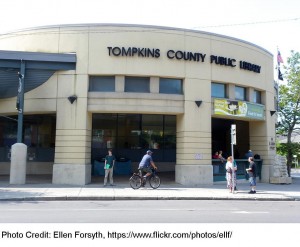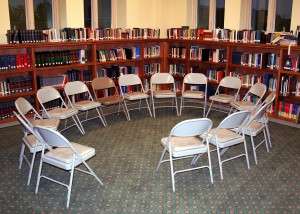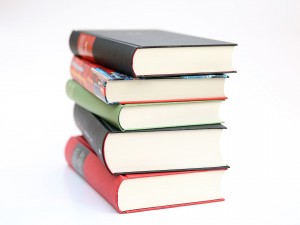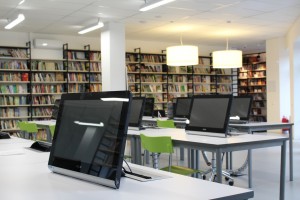 In this day of high priced books and new technology, public libraries are an invaluable resource for authors as well as readers in general. I sometimes think my local library, the Tompkins County Public Library is beyond compare, but I constantly run into articles and posts by people around the country, around the world, who love their libraries just as much.
In this day of high priced books and new technology, public libraries are an invaluable resource for authors as well as readers in general. I sometimes think my local library, the Tompkins County Public Library is beyond compare, but I constantly run into articles and posts by people around the country, around the world, who love their libraries just as much.
For an author, a library can be a quiet place to work. Computers are usually available, both with internet access and with Word software. If you buy a thumb drive, you can instantly upload your work, add to it or edit, and even print it off at the library. There are also just large desks to spread your work out on, to bring your own computer (free wifi is also available.) There are free study rooms if you need a place for a meeting or discussion, but sometimes being out in the open, in quiet and yet with other people around can keep you from feeling too cut off from humanity.
 Most libraries have a space to use for author readings. Sometimes a fee may be charged, but sometimes the library will sponsor (and advertise) the reading. Usually there is a specific person who organizes community/author events, and it’s worth a call (or email) to find out who that might be. A reading in your local library is likely to draw more people than in a stranger’s town, and is a good way to “handsell” your book.
Most libraries have a space to use for author readings. Sometimes a fee may be charged, but sometimes the library will sponsor (and advertise) the reading. Usually there is a specific person who organizes community/author events, and it’s worth a call (or email) to find out who that might be. A reading in your local library is likely to draw more people than in a stranger’s town, and is a good way to “handsell” your book.
A library carries research books as well as the capacity to do internet research. If you want to check out other titles in your genre, this is the place to do it. While bookstores have the latest books, libaries have the important capability of having a good backstock: books that are no longer in print, or no longer on the New York Times bestseller list. My library is part of the larger Finger Lakes Library System, and you can borrow books from other communities.
 Libraries will usually buy a hard cover copy of your book if you live locally. You might also want to consider donating a copy, just to get your book in stock. Then, whenever you do a reading, an interview, you can mention that your book “is available at the library.” Libraries struggle with funding like every group, but if your book is there, it is more likely that they will proactively buy your next book.
Libraries will usually buy a hard cover copy of your book if you live locally. You might also want to consider donating a copy, just to get your book in stock. Then, whenever you do a reading, an interview, you can mention that your book “is available at the library.” Libraries struggle with funding like every group, but if your book is there, it is more likely that they will proactively buy your next book.
The highly esteemed Library Journal is a national guide for librarians choosing what books to buy in the future. Getting a good review in the Library Journal will almost guarantee that your book will be selected for purchase by medium-larger sized libraries. There are estimated to be over 119,000 libraries in the US today; reaching even a portion of these would make for a lot of hardcover sales!
Your local library may have other assets: book club contacts, writer’s group contacts, bulletin boards for displaying writer-related events, small grants for some authors to do workshops or readings. In Ithaca, besides the public library, there are also many Cornell specialty libraries, and both Ithaca College and TC3 also have good libraries with not only books but audio-visual resources as well.
 Libraries are becoming a cultural hub for many towns and cities, greeting the new technology age by offering ebooks and workshops on using ebooks and other computer services. My local library has extended itself to an outreach program on the town commons, offering book loans to anyone, but especially children. There is an amazing program of events for young readers, and occasionally workshops for young writers. In NYC, the public library system has formally agreed to be the library system for the public schools. If you write for young adults, this kind of change could help get your book widely disseminated.
Libraries are becoming a cultural hub for many towns and cities, greeting the new technology age by offering ebooks and workshops on using ebooks and other computer services. My local library has extended itself to an outreach program on the town commons, offering book loans to anyone, but especially children. There is an amazing program of events for young readers, and occasionally workshops for young writers. In NYC, the public library system has formally agreed to be the library system for the public schools. If you write for young adults, this kind of change could help get your book widely disseminated.
Public Libraries are free. You can use their resources for free. You can find other people, and increasingly, breaking technologies available whatever your income level. If you haven’t been to your local library or at least not recently, figure out what you might need as a writer, and the chances are the library will be able to help you get what you want.

I love our library.